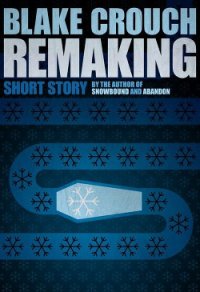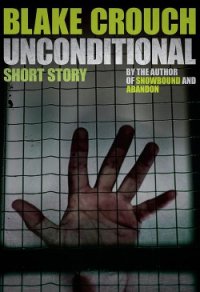Break You - Crouch Blake (книги без регистрации полные версии txt) 📗
Vi glanced over at the cardboard box lined with old newspapers, the shopping cart beside it.
“I was just cold, trying to get out of the rain,” she said. “I smelled the smoke, so I came in here.”
“You just want to get warm.”
“That’s all.”
He considered this, said finally, “Put your knife away, and come on over.”
The man walked over to the oil drum. He knelt down and gathered a few scraps of wood and fed them into the fire, then held his hands over the heat.
Violet set her knife on the windowsill and joined him, extending her hands over the flames.
She felt lightheaded, attributed this to thirst, hunger, and the smoke she was breathing in.
“I’m Violet,” she said. “I didn’t mean to intrude.”
The man watched her. His beard was a deep, greasy black, and the few patches of skin that showed through, dirty but unwrinkled. Her first impression of him had been an old man, but now she reconsidered.
“What are you doing out here,” he asked, “in the concrete barrens?”
Violet didn’t know how to answer that question, so she just stared down into the flames and the bed of embers underneath.
“Don’t you know it’s dangerous out here?” he continued. “Nothing but bangers and people like me.”
In his words, Vi discerned an obvious intelligence.
“What do you mean, ‘people like me?’” she asked.
Now he stared into the flames, which had grown brighter.
Out the window, Vi could see the light draining from the sky.
Darkness falling with surprising speed.
“You shouldn’t be here,” he said.
Luther spoke into Violet’s ear, “Tell him you want to stay the night. You have a lot to learn from him.”
She didn’t say anything.
“Tell him or I will rip Jennifer’s baby apart right now.”
“Can I stay here tonight?” Violet said. “I don’t have anywhere to go.”
The man looked up from the fire and studied her.
Nodded.
“What’s your name?” Vi asked.
It took him five seconds to answer, as if he hadn’t said the word in ages.
“Matthew,” he finally whispered.
It was full-on dark within the hour. They sat against the wall beside the oil drum, Vi ravenously drinking water from a milk jug.
Matthew rummaged through a plastic bag of snack food, finally withdrawing a packet of crackers. He offered the bag to Vi.
She didn’t know when she’d eaten last.
Reached in and grabbed a bag of potato chips, ripped them open.
“Thank you,” she said.
They ate quickly and in silence.
When Vi finished, she stared longingly at the bag again, but didn’t ask.
“It’s been a lean month,” Matthew said, “or I’d offer you more. I have to store up for the winter months.”
“You’re going to stay here?”
“Where else you think I’m going to go?”
“What will you do?”
He pointed toward a stack of books in a corner of the room—must’ve stood six or seven feet tall.
“When it’s warm, I spend my days at the library, but it’s too far to walk there every day in the cold. I’ve been collecting them. I’m going to read them all, starting at the top.”
“What kind of books are they?”
“Mostly philosophy. A few classic novels. Occasional comic book thrown in for spice.”
“Philosophy, huh?”
“I think it’s really the only thing worth reading.”
Violet studied the room. The squalor. Couldn’t imagine spending a night in this place. She knew the vast majority of the homeless suffered from debilitating mental illness, and wondered what storm raged behind Matthew’s vivid blues.
“I’m in a bad spot,” Violet said, her voice just a few notches north of a whisper, wondering if Luther could hear her now. If he could see her.
Matthew wiped a few crumbs out of his beard and stared at Vi. He lifted a jug of Carla Rossi to his lips and took a generous pull. When he’d finished, he offered it to Violet.
“No thank you.”
He drank some more, then rose and fed the fire from the impressive pile of scrap wood he’d lined up against the wall.
“All these abandoned houses,” he said with a smirk, “keep me warm and toasty during the snows. An endless supply of firewood.”
The wine seemed to have lifted his spirits, loosened his tongue.
“I have everything I need here,” he said. “Warmth. Drink. Food. Books.”
“What did you have before?”
He looked at her like she’d cut him but he answered without pause.
“An electricity bill, a cable bill, a cell phone bill, health insurance, life insurance, car insurance, homeowners insurance, VISA statement, Mastercard statement, Discovery Card statement, Mileage Plus card, AVIS card, mortgage, car payment, truck payment, line of credit, fifty hour work weeks, in-laws, accountants, annual physicals, multivitamins, Wellbutrin, Advil, a book club, a bible study group, rec center membership, golf club membership, a basketball game every other Thursday night, poker at my friend Jim’s every other month, four different stops on Thanksgiving and Christmas, sex twice a week, taxes once a year, waking in the middle of the night every night wondering how to keep everything afloat, and beautiful children who grow up so fast I can’t even look at them.”
He hit the wine again—a long and focused pull.
His eyes shimmering.
“I used to live a half mile from here,” he said. “I’ve taken siding from my old house to keep a fire going. This place was so vibrant. Kids always playing in the streets. Block parties. A great community.”
“You were an autoworker?”
“I worked in the GM truck assembly plant for nineteen years.”
“When did it close?”
“Six years ago, when GM moved the operation to Korea. Everyone lost their jobs. When the plant closed, this town just died. Like the old west come to Michigan. Eight months later, the bank took our house. I didn’t handle it well. My wife left, took my boys with her.”
“I’m sorry,” Violet said.
“When I got out of the institution, I came back here.”
“Why?”
“It’s hard to explain. I just felt like this was where I needed to be.”
“Don’t you think about all you lost though? Isn’t it thrown in your face here?”
“Of course. Every day. But after absolute loss, it still continues.”
“What?”
“You. Consciousness. There is life after hope, you know.”
The fire popped.
“And what does that life look like?”
“Not what you’d expect?”
“No?”
“You realize something,” Matthew said.
“What’s that?”
“That you go on. That you can take so much more pain than you think. We’re built for it. It’s almost like that’s our purpose. We’re vessels that exist to be filled with pain.”
“That’s depressing.”
“No, that’s truth. And once you come to terms with it, it changes you. After everything is taken from you, you see that you still have control over so much. Control over how you cope with misery. You realize all the beautiful choices you still own. Like whether to love or hate. Or forgive.”
Violet pushed against her knees and came to her feet. Walked over to the scrap-wood pile and loaded a few two-by-sixes into the fire that looked like they’d been torn from the side of a house. Outside, it was sleeting—the dry tick of ice pellets bouncing off the pavement.
“What kind of trouble are you in?” Matthew asked.
“I lost my husband a year ago.”
“What happened?”
“He was murdered. My life has sort of...unwound...since then.”
“You’ve lost a lot.”
“I’ve lost everything.”
Matthew struggled to his feet and shuffled over to his cardboard box which had once held a refrigerator. He dragged out a pillow and tossed it across the room.
“Sleep by the fire,” he said. “Feed it when it gets low.”
“Matthew,” she said.
“Yeah?”
“Come here.”
He staggered over.
Violet reached up and covered the earpiece, hoping her hand would muffle the microphone, if it was even activated.




